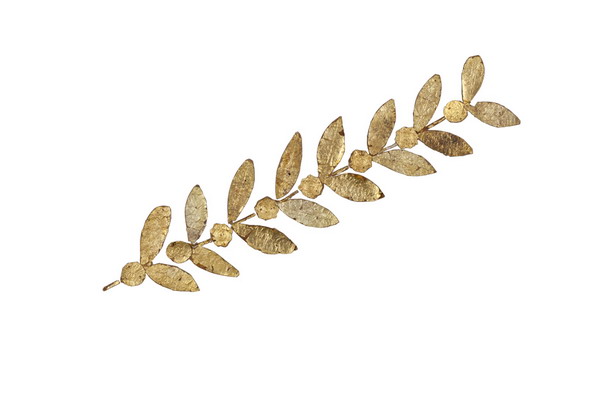 |
|
A laurel and olive branch diadem reflects the high social status of its owner.Photo provided to China Daily |
Around the 12th century BC, the Etruscans emerged in northern Italy. Their power peaked during the 6th century BC, when three of the seven kings of the Roman Kingdom were Etruscans. The Etruscan culture was eventually assimilated into the Roman culture in 1st century BC.
The touring exhibition in China, titled The Etruscans: Exhibition of the Dawn of Ancient Italy, displays the ancient civilization's religion, architecture, art and funerary customs, with urns, sarcophaguses and grave goods unearthed from tombs.
The urns and sarcophaguses are the main part of the exhibition. The ceramic urns from the civilization's early stages were shaped to resemble the houses of the deceased. In later years, the stone sarcophaguses or alabaster urns were lavishly decorated with sculptures depicting the afterlife.
"Most of the items on display at the exhibitions in China have never left Italy. Usually they are locked in storerooms," Madaro says.
The most important piece is a pediment of the Temple of Talamonaccio, the only known complete architectural decoration from the late Etruscan period.
The temple was burned to the ground shortly after 100 BC. In 1892, an old cistern was uncovered by people building a fort. The terracotta fragments that made up the pediment were discovered around the cistern.
"Archeologists spent 10 years restoring the big pediment whose sculpting decorations tell the myth 'the seven against Thebes' with the terracotta fragments," says Franco Cecchi, deputy director of the Florence Archeological Museum, which provided the majority of the items for the exhibition tour in China.
"After its Chinese tour, the pediment will be displayed at the Expo Milano 2015 and it may be its last show on loan because it is so delicate," Cecchi says.
Liu Li, coordinator of international exhibitions at the Guangdong Museum, says the exhibition is one of the few on Italian archeology that has been displayed in China. "Most of the exhibitions about Italy on display in China have been about art, like the one of the Italian Baroque oil paintings we hosted two years ago," Liu says.
"We hope to bring a series of exhibitions to introduce different perspectives of Italy in the future to give our audiences comprehensive knowledge about the country."
The exhibition has also been displayed in Wuhan and Hangzhou and will be featured at Emperor Qinshihuang's Mausoleum Site Museum in Xi'an from Sept 5 to Dec 7.
|
|
|
|
|
|
|
|
